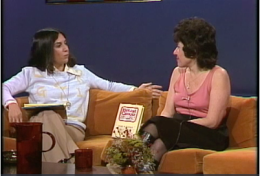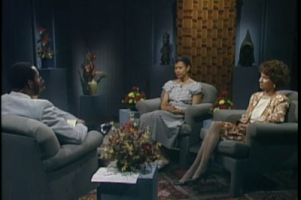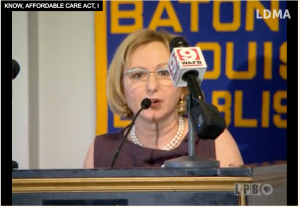As lawmakers currently decide the future of American healthcare, many politicians and organizations are seizing the opportunity to express their own sentiments on the subject. A particularly hot topic has been how the new law will affect women, which has long been a controversial subject in the United States. The modern women’s healthcare movement has its roots in the figure of Margaret Sanger. Though she had to take temporary asylum in Europe after illegally distributing contraceptive information, Sanger eventually established the modern-day Planned Parenthood in 1921. To learn more about the evolution of women’s healthcare, content from the American Archive of Public Broadcasting facilitates an analysis of how public opinion of healthcare has developed over the last forty years.
In the 70s, WN ED of Buffalo, N.Y. produced a series of interviews entitled “Woman.” On Dec. 4, 1975, WNED recorded an episode with breast cancer advocate Rose Kushner. Interviewed by Sandra Elkin, Kushner criticizes the routine medical practices taken in treatment of breast cancer in the United States. Instead, she praises the practices of other countries with nationalized healthcare systems: “There is a big difference in countries where medicine is nationalized,” she explains. For context, a timeline by PBS reports that in the 70s, healthcare was “seen as in crisis” due to the quickly rising costs.
ED of Buffalo, N.Y. produced a series of interviews entitled “Woman.” On Dec. 4, 1975, WNED recorded an episode with breast cancer advocate Rose Kushner. Interviewed by Sandra Elkin, Kushner criticizes the routine medical practices taken in treatment of breast cancer in the United States. Instead, she praises the practices of other countries with nationalized healthcare systems: “There is a big difference in countries where medicine is nationalized,” she explains. For context, a timeline by PBS reports that in the 70s, healthcare was “seen as in crisis” due to the quickly rising costs.
 About twenty years later in 1992, healthcare costs continued to rise due to economic inflation. On July 29, Kojo Nnmadi hosted a group of four women to speak on his WHUT-produced program, Evening Exchange, in Washington, D.C. The guests included physician Maggie Covington, naturopathologist Andrea Sullivan, president of the National Black Women’s Health project Julia Scott, and president of the Black Lesbian Support Group Cindy Smith. In the program, Scott explains her view that minority women do not receive enough care in medicine, stating that “there is a lot happening in our society that has to do with racism and classicism that makes poor women be much more ill than other segments of the population.” The program ends with the conclusion that women need greater representation in the healthcare system, as Cindy Smith asserts “it’s still a man’s world.”
About twenty years later in 1992, healthcare costs continued to rise due to economic inflation. On July 29, Kojo Nnmadi hosted a group of four women to speak on his WHUT-produced program, Evening Exchange, in Washington, D.C. The guests included physician Maggie Covington, naturopathologist Andrea Sullivan, president of the National Black Women’s Health project Julia Scott, and president of the Black Lesbian Support Group Cindy Smith. In the program, Scott explains her view that minority women do not receive enough care in medicine, stating that “there is a lot happening in our society that has to do with racism and classicism that makes poor women be much more ill than other segments of the population.” The program ends with the conclusion that women need greater representation in the healthcare system, as Cindy Smith asserts “it’s still a man’s world.”
 Another twenty years later, President Barack Obama signed into existence his healthcare reform bill in 2010. In a 2013 Louisiana Public Broadcasting broadcast, Donna Fraiche speaks at the Baton Rotary Club on the now three-year-old Affordable Care Act. Although moving away from the lens of the female experience, she details the high costs of American healthcare. Notably, Fraiche outlines that “we’re the richest country in the world, but we spend the most of our dollars on healthcare.” Her knowledge of Japan allows her to explain the differences in the American and Japanese systems, since she served as honorary consul-general of Japan for New Orleans.
Another twenty years later, President Barack Obama signed into existence his healthcare reform bill in 2010. In a 2013 Louisiana Public Broadcasting broadcast, Donna Fraiche speaks at the Baton Rotary Club on the now three-year-old Affordable Care Act. Although moving away from the lens of the female experience, she details the high costs of American healthcare. Notably, Fraiche outlines that “we’re the richest country in the world, but we spend the most of our dollars on healthcare.” Her knowledge of Japan allows her to explain the differences in the American and Japanese systems, since she served as honorary consul-general of Japan for New Orleans.
Today, this passion for a stronger healthcare system thrives as the American people continue the journey to find a system that is beneficial for our country. Though laws and politics may continue to change, history affirms our dedication towards bettering our medical care. In these programs, the women all had drastically different perspectives and backgrounds, ranging from writers to lawyers to advocates. Yet, they all provided information that helped to develop and challenge public notions of healthcare in the United States.
 This post was written by Hannah Gore, AAPB Intro to Media Archives Intern and student at Dickinson College.
This post was written by Hannah Gore, AAPB Intro to Media Archives Intern and student at Dickinson College.
